Opinion
How my team secured $57 million for Water Projects in Ondo State, By Tunji Light Ariyomo
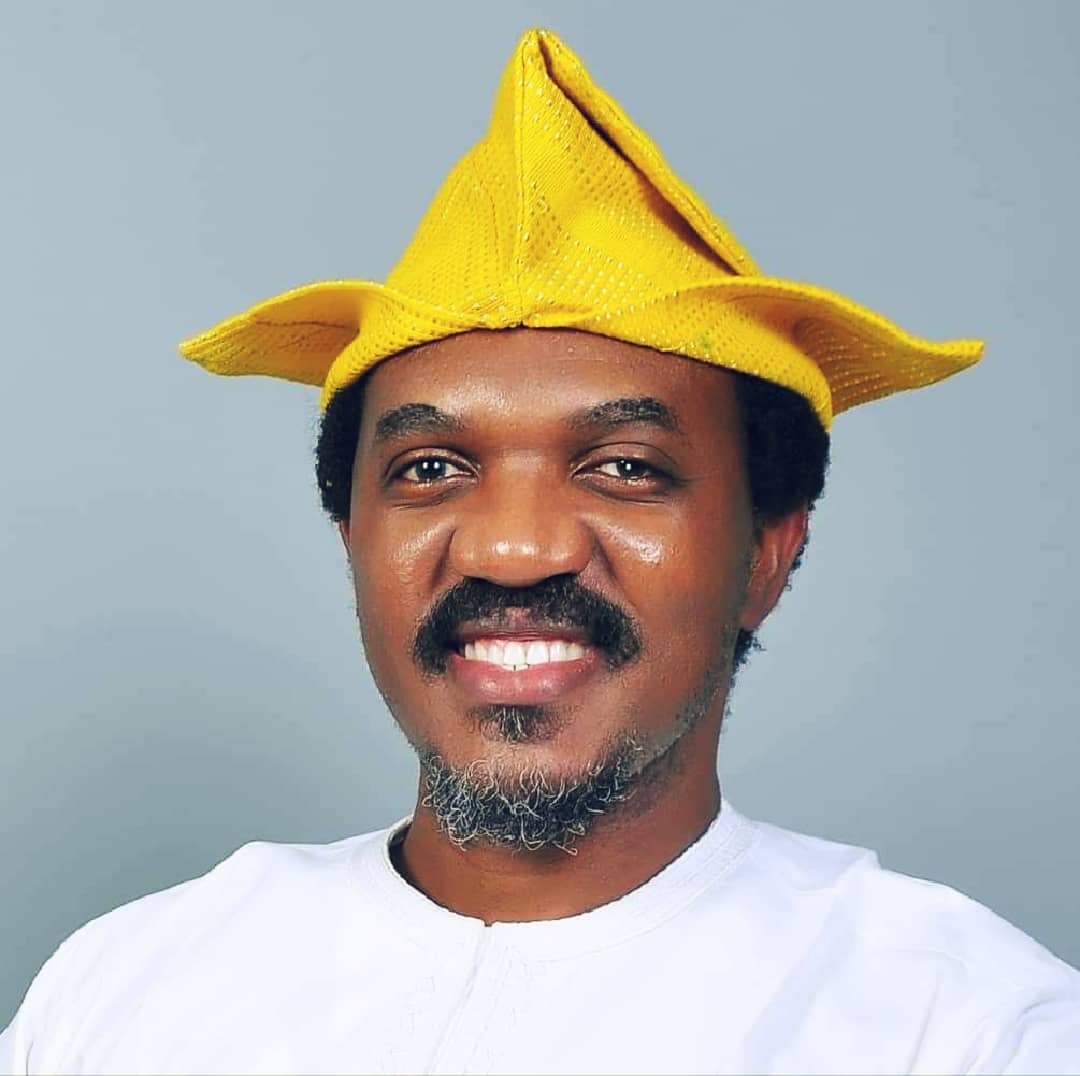
On Saturday 9th March 2024, scores of my friends and brothers from across the globe including the US-based talented visual artist, Sunday Oluwasomi, the scion of the late Olisa Raymond Olusoga (Prime Minister of Akure Kingdom) Engr Taiwo Olusoga, Aquinarian Tunde Aladenola, and a host of others called my attention to a negative counterclaim of an individual on one of my team’s best legacies in Ondo State. It was about our success in the financial closure of the sum of US dollars 57 million and the actual collection of the first tranche of the money into the purse of the Ondo State Government as well as my team’s accomplishment in securing AfDB first preliminary approval for an additional $112.72 million ($82.72 million for water, $20million for power, and $10 million in grant) whilst I served as the Special Adviser on Public Utilities, supervising Water Resources and Energy at cabinet level before my redeployment. Unknown to me, several other people who admire me had shared screenshots of the apocryphal claims with me via my Whatsapp inbox. My friend’s Dad, one of our political leaders in Ondo State, Chief Ademola Ijabiyi, was also very concerned and requested that it was important I be added to the platform where such dubious claims were made so I could lay them to rest. I was, however, encumbered with a professional assessment report that I had to submit on behalf of one of my mentees and could not react or respond immediately. I promised Chief Ijabiyi and the others that I would respond comprehensively.
In the interim, I did what was the most basic, I called witnesses! I left the duty of articulation of the roles played by my team to eyewitnesses who were part of the process. Today, there are at least one hundred civil servants who played one role or the other and are still in active service. So, individuals like Sunday Oluwasomi, Taiwo Olusoga, and Tunde Aladenola had the privilege of hearing truthful accounts of what happened directly from those who were involved. Even aspects of our patriotic escapades that I had forgotten were brought back to memory. Those who were directly and actively involved in the processes exposed the carefully orchestrated lies of those who desired to piggyback on the success of our sweat and have perhaps been surreptitiously deceiving others about their fabled roles. If individuals could outrightly tell bald-faced lies and deny what just happened only a few years ago where the hard records are still available and the dramatis personae are all alive, then this comprehensive account of what happened is necessary to set the records straight and for posterity.
For the benefit of the reader, the counterclaim against our legacy is that two commissioners under the previous administration of Dr. Olusegun Mimiko were responsible for securing the funds for Ondo State and that all our team did was get there, cash the cheques and begin to spend the money. The claim asserted that they brought in the sum of $75 million from the World Bank for the construction of the transmission mains of the Owena Multipurpose dam and its reticulation to the state capital. I hate to be seen to be addressing issues in a way that appears to pit me against Dr. Mimiko who is an iconic leader in the state in his own right. I will want this not to be misconstrued as that is not my objective. I am only setting the record straight.
Upfront, I herein state unequivocally that when I took over as the de facto leader of the state’s water project in October 2017 (by the Governor’s written directive, I covered the duties of the Commissioners in charge of Water Resources and Electricity Matters), I did not meet any record of the sum of $75 million World Bank fund whether in cash, cheque, bank lodgement, or approval-in-file. I concede that for about 8 years prior to my taking over, there were attempts to secure funds and several offers probably flew around just like I also got the first offer from the AfDB for $112.72 million. But offers are what they are. The real job is being able to develop the business case document, financial models, and ancillary technical documentation required to meet the conditions precedents attached to a serious offer. The serious efforts of those who laboured hard to achieve that must never be dismissed on the altar of cheap politics.
I must also hasten to add, that ever since I even left the water project, not a single kobo in new funds has been added to the state programme. In fact, the most anticipated fund in the state’s water sector today is the AfDB $112.72 million (now negotiated to circa $104 million) which is solely the benefit of the robust foundation laid by my team.
For the avoidance of doubt, the following individuals were part of my team on the state water project as of that time, Engr. Jimmy Akinrimade MNSE, then General Manager of the Ondo State Water Corporation, Engr. Steve Adesemuyi MNSE who was in charge of procurement, and Engr. Toba Akinde MNSE, who I later recommended to the Governor for appointment as the State Coordinator of the project. Other members of my team at the Office of Public Utilities (OPU) which had ministerial supervision of the Ondo State Water Corporation as of then, were Princess Abike Bayo-Ilawole, Engr. Olumayowa Ajumobi, MNSE, Mr. Deji Akinwumi, Dr. (Mrs) Tolulope Pius-Fadipe, Mrs. Doris Adekale, and others. I mentioned these names as they are all alive and well. These are mostly civil servants. They were committed to our success then. They supported me and were active witnesses to all that we did to secure the funds.
By the way, I was not “only part of the government negotiation team that held meetings with the World Bank and Federal Ministry of Water Resources” as claimed in one of the infantile comments, not at all. Rather, I was the leader of the Ondo State Government team that negotiated the funds with the French Development Agency (AFD), and the International Economic Relations Department of the Federal Ministry of Finance where an Ondo State son, Mr. Timothy Komolafe, ensured we were properly guided to abide by all due process requirements among others. My team simply fast-tracked the processes with our proactiveness and became the first state to execute the SLA on the 26th of March 2018. The claim that “(they) were at the point of accessing the money that (sic) (they) left the government and Akeredolu’s government continued from there” is therefore totally simplistic and untrue. No money could have been accessed by anyone without fulfilling all the conditions precedents, negotiation of terms, as well as the execution of the principal and subsidiary agreements. The agreement indeed marked the definitive period of the effectiveness of the fund for the state. My team delivered all these.
I can thus speak authoritatively about what the team I led did, how we did it, the amount of money involved, and why – at the risk of sounding boastful – what we did to secure that money within a limited time is purely the stuff of legends. Indeed, the last hurdle for us to cross was how to bypass the petition by a private company that had found a way to ensure that AFD inserted the settlement of its claim against the state government as a condition precedent to disbursement. Governor Akeredolu in the presence of the company’s representative gave me the carte blanche to resolve the issue. We took up space at the Heritage Hotel in Akure with the company and spent about four hours without success. They insisted on a payout of as much as N4 billion. It didn’t make sense to me. I reported to the Governor. Time was of the essence and I took permission from him to resolve it the way I could. All we had to do was convince the AFD to drop that requirement as a condition precedent. AFD stood its ground.
Then the epiphany dawned on me of a concept in law called the statute of limitations that we learnt as student engineers in our only introductory contract law class. The contract over which the company was imposing a claim upon Ondo State was already 9 years old. I immediately tried my best to again research the subject of the statute of limitations. The more I did, the more pleasant it sounded that I had found the holy grail as the contract was statute-barred. Having learnt proper legal referencing style from my former Special Assistant, Mrs. Babagbenga Alalade Esq, years back, I decided to produce a draft legal opinion on the subject. I focused extensively on Nigerian laws as my primary authority, followed by copious quotes from the legal jurisprudence of both the United Kingdom and France. Incidentally, the three countries (Nigeria, UK and France) each retain 6 years as the bar for a business-related claim. I inserted the French law deliberately since the AFD legal officers who would review the legal opinion in France were more likely to be French nationals.
After I was done, I decided to call two lawyers who were very close to me, my big Egbon, Rotimi Aladesanmi Esq as well as my good aburo Mrs Sandra Ogunmola, Esq. I told them about my quackery and apologised to them that my office did not have the money to secure the service of a lawyer. Out of patriotism and solidarity with the state, Bar. Aladesanmi asked me if the State Water Corporation had been maintaining correspondence with the company. I told him I had a hunch some months back that we might have insiders acting as fifth columnists and I had thereafter insisted that any correspondence on the matter must be solely by the state Ministry of Justice. I let him know that on several occasions afterwards when the GM approached me to allow him to send a polite letter to the company, I had always declined insisting instead that only the Ministry of Justice should issue any communication to them and that he and I must stick to engineering only. I added that to prevent any mistake when the GM told me that the legal officer of the Corporation was in support of a polite letter, I quickly got the Justice Ministry to write the Corporation to desist from any correspondence. Both lawyers appeared to substantially think I was already making sense. That gave me confidence and I decided to take the draft legal opinion to Mr. Kola Olawoye, SAN, the then Attorney General and Commissioner for Justice, a fantastic administrator who would go to any legitimate length to assist us on our processes. The distinguished SAN read the draft and asked me who produced it. I jokingly told him one ‘charge and bail’ guy did. The Attorney General assumed a friend of mine did and chastised me never to refer to my friend as a charge and bail lawyer because he had produced a brilliant legal opinion! He told me he was adopting it verbatim – no correction.
My Special Assistant, Dr. (Mrs) Tolulope Pius-Fadipe made eye contact with me. I pretended I didn’t see her. The Honourable Commissioner for Justice executed the instrument and handed same to me. By 2 pm, we had scanned and forwarded it to the headquarters of the AFD in France with copies to the country representative in Nigeria. We had the hard copy dispatched by courier. Not quite 30 minutes after the email, I received a phone call from AFD’s Country Manager in Abuja who sought my permission for a conference call with France. Their legal officer in France had reviewed the legal opinion (our letter) and had concurred with us that the requirement that granted an advantage to a private company to more or less put a lien on our request and demanded N4 billion from the government of Ondo State be dropped! Yes. It happened in one day. They apologized and assured me to await an email giving us all clear so we could proceed to the disbursement stage.
The email came and the important line was “There is no more issue on this point as my legal department took into consideration your last letter and agreed to clear the condition precedent”. That was how we resolved the last hurdle on that fund. It was only after I succeeded in removing that final obstacle that I forwarded the ‘all clear’ good news from the then Country Manager of AFD, Ms Jeanne VANUXEM-MILLELIRI, to the then GM of the Ondo State Water Corporation (Engr Akinrinmade) and the then State Coordinator of the Water Project (Engr Akinde) on August 24, 2018 at exactly 3:03 pm.
Ayo Sotinrin who was with the Governor when I passed the news via phone later told me that the Governor asked him, “How did Tunji do it?”. As the late Governor Oluwarotimi Akeredolu SAN later acknowledged in a private letter to then President Muhammadu Buhari, “Engr. Olatunji Ariyomo, FNSE, led the team that negotiated and secured the $57 million AFD funding for our administration… His team succeeded in scaling “18 No Objections” under 12 months which was a record by any sub-national government even by AFD standard”.
As if by divine intervention, the AFD sent me a dusburement schedule confirmation for the $57 million (with dates) on the very day we were receiving the Federal Minister for Water Resources. Mr. Yemi Olowolabi, a veteran journalist of the Tell Magazine era who was the Commissioner for Information had to break protocol to get the great news across to Governor Akeredolu carrying my mobile phone with him to enable both the Governor and his guest to read directly the giant leap Ondo just made.
Essentially, ahead of other states that were part of the NUWSRP III scheme, Ondo State reached financial closure in a manner that earned our state the direct commendation of the French Development Agency (AFD). How did we do it?
We were proactive. We did not wait for the AFD to spoonfeed us. During the development of the programme appraisal document, we fast-tracked the process by spending endless sleepless nights to ensure we crafted a programme that would serve the interest of the people of Ondo State. Working with the AFD country office and officers from their headquarters in France, we developed a PAD and Programme Information Manual that would be difficult for anybody to breach. When we eventually secured approval to commence implementation, the least of the RfPs that we produced was that of the PMS and the cartography which contained a minimum of 130 pages. We were yet to select a consultant (PMS), so we did all these by ourselves. I led from the front, drafted and poured through all the pages and knew everything that went into each line. We submitted to all world-class financial probity and accountability processes. We shielded the programme from the vagaries of politics and external influence. This was why I could boast when I was suddenly removed from the project that I was certain that the vile characters that were plotting and scheming to oust me from the project because they were eying the money instead of the goals were on a futile zero-sum mission. I was that certain. Yes, the processes can be delayed at a great cost if incompetent individuals are saddled with anchoring the project or positioned to lead the project. This is why the project is currently 2 years behind schedule. Though time itself is costly. That is the worst that can happen. The money for the project cannot be stolen or looted. They may not even be able to access the funds due to the stringent conditions we imposed from the very beginning. I secured the first tranche of disbursement before my exit from the programme. That was the only tranche accessed up until December 2023. The programme almost went into sleep mode afterwards. Governor Akeredolu had to beg the duo of Ayo Sotinrin and Tope Runsewe to step in and help as the leadership that took over after me was simply unable to understand the programme.
When the Governor announced a cabinet reshuffle and had me assigned to solely Energy, some people suggested that I should write a petition to the AFD and allege political interference in order to stop the project. I refused bluntly. I have never fought over money in my life. The money we secured was for the benefit of the people of Ondo State. Phase one of the project was solely for Akure metropolitan area. As a child, I enjoyed pipe-borne water in Akure. My sole motivation was therefore to help Akure regain that lost era. I have never been a fan of borehole drilling as I saw it as an unsustainable workaround that must not be encouraged because it takes the average aquifer years to recharge adequately. Upon realization that not a single community along the transit route of the water mains from Igbaraoke to Akure was included in the project, I held meetings with notable traditional rulers from Ifedore, particularly the Olowa of Igbaraoke, Oba (Dr) Adefarakanmi Agbede OFR in his palace. I assured Kabiyesi that we would leave no stone unturned to ensure that the water project was extended to all communities adjoining the route of the transmission mains such as Igbaraoke, Ipogun, Ilara, Ibuji, Ijare etc and that we would leverage that advantage to take reticulated water to places like Ondo East and Ondo West. The business mogul, Chief Michael Ade-Ojo also placed a phone call to me, offering to fund the T-off of the water from the mains to Ilara. I thanked Baba Ade-Ojo for his selfless offer and informed him that the governor had already approved my proposal to extend the reticulation to all towns along the mains’ transit route.
This is what led to our additional effort to secure the $112.72 million from the African Development Bank (AfDB) starting in May 2019 with an earlier Mission Visit by the AfDB team. This second fund was to address (i) the outstanding 50% reticulation coverage of Akure metropolitan area under the AFD’s sponsored Owena Multipurpose Dam Water Project and reticulation to all satellite towns and communities along the water transmission route from Igbara-oke to the state capital, (ii) the reconstruction of the collapsed spillway and the restoration of the raw water line and the High Lift Pumps for the new intake at the Owena–Ondo road (Elegbudu agba) water supply scheme with design capacity of 19,800m3/day of treated water, which was originally built in 1965 but had since been in deplorable conditions, (iii) rehabilitation of treatment plants and augmentation scheme for Owena Ondo road, (iv) rehabilitation of Olokuta booster station serving the Owena Ondo road scheme, (v) construction of booster station for the rising mains serving Idanre and Ondo towns (in Ondo West and East LGAs) in addition to the relocation of transmission pipelines on that route, (vi) rehabilitation of Owo-Osse water supply treatment plants and augmentation scheme, (vii) repair, relocation and reconstruction of Owo Township water distribution pipes, (viii) upgrade and rehabilitation of the 2,115m3 service reservoir in Owo, (ix) replacement of damaged transmission mains to Owo and adjoining satellite beneficiary communities, (v) as well as critical intervention in Ilaje local government areas in Ondo South. Our engineering estimate for these projects at the time was USD 82.72 million. In addition, the state government was providing off-grid electricity supplies to communities in Ondo South that were far away from the national grid. We, therefore, made an allowance of USD 20 million for the implementation of commercial mini-grid power projects in 10 communities with distribution infrastructure, metering and other ancillary services. The late Governor fully supported my initiatives and via a letter with reference number H.E/VOL III/138c dated 3rd of June 2019 presented a formal request to the Federal Ministry of Finance and the AfDB for a total sum of USD 102.72 million with an additional grant component of USD 10million to enable the state government implement quick-win water and power projects across the state. The Governor put the state’s Office of Public Utilities which I headed, the state’s Technical Team and Steering Committee on Urban Water Supply which I chaired, the state’s Water Corporation which I supervised, the state’s Electricity Board which I supervised and the state’s Technical Team on Power which I headed, in charge, with the duty to midwife the processes. We secured the preliminary concurrence of AfDB shortly after. Of course, following my exit from the programme, I learnt that these clearly defined project pipelines that cut across the state were altered and the estimates for off-grid power intervention in Ondo South were completely expunged despite their detailed communication to the AfDB and the Federal Ministry of Finance.
The AFD and not the World Bank gave Ondo State the sum of $57 million for the construction of the transmission main and the reticulation infrastructure in the state capital. The project is ongoing. The money cannot be looted – not with the way we designed the programme. The World Bank invested in a lot of institutional strengthening and water sector governance being spearheaded by the Federal Ministry of Water Resources. Incidentally, an engineer and an Ondo State son, Engr. Benson Ajisegiri was the Director at the Federal Ministry of Water Resources as of then. The World Bank provided the sum of $2.3 million for each of the 9 states on the NUWSRP III programme with a substantial works component. I worked with other Commissioners and Advisers on Water Resources to correct the attempt by the Ministry to target that money solely at institutional governance at the expense of tangible works programmes. In fact, I spoke on behalf of the others. I showed the officials of the Federal Ministry of Water Resources from the principal approval by the World Bank that the $2.3 million was structured to substantially address works – physical output specification, tangibles that the ordinary people on the street could appreciate and that could further engender confidence in political leaders to support water-related programmes. Officials of the Federal Ministry of Water Resources led by Engr. Ajisegiri concurred with my argument. For Ondo State, we agreed that ahead of the effectiveness of the AFD fund, we would rehabilitate parts of the Owena Ondo Road water scheme as a Quick Win and have the water transmitted to a ring-fenced and commercially viable place in the state capital since the residents were adjudged in the entire Ondo State by our survey as the people most likely to pay. It was agreed that it would be our opportunity to practically assess water commercialization ahead of the full-scale reticulation project.
So, let’s put it in context, ever since my exit from the state water project, there was no new fund attracted to the water programme by any of my successors. The funds expended on water-related projects in Ondo State were solely the ones my team succeeded in creating, attracting, initiating or fast-tracking. This included the $2.3 million which the procurement was eventually done by the Federal Ministry of Water Resources, the N702 million counterpart funding that I secured from Access Bank Plc with procurement done in Ondo State, and the first tranche of $5 million being part of the larger $57 million from the AFD. Indeed, because the project was lagging, the new handlers could not access any more money from the $57 million until December 2023! Likewise, the biggest funding prospect for future activities in the water sector in the state is the AfDB fund that I initiated! Essentially, years after exiting the state’s water project, I have earned the bragging right to say that my efforts continue to pave the way for the state in an enduring manner. I have been part of a Federal Government project worth $7.1 billion, yet, I will defend a legacy that costs only $1 if it is threatened by folks who know nothing about the sweat quotient that goes into project development.
By the way, it must be stated that the whole Owena water transmission and reticulation project was inspired by the late Dr. Olusegun Agagu. He birthed the vision and succeeded in getting President Olusegun Obasanjo to cede the water distribution aspect of the Owena Multipurpose Dam project to the Ondo State Government. Dr. Agagu already paid half of what was required to the contractor before his sudden exit from the government but the project was subsequently bungled and frustrated.
I have done my best to stick to issues that celebrate the accomplishment of my team in this piece. I could never have achieved any of these without the support of those earlier mentioned and my friends in Abuja who provided accommodation on those occasions when my office could not fund same or those like Taiwo Olusoga who repaired my ‘dakudaji’ official car. I wasn’t provided an official car while in government. I walked into the old yard of the Water Corporation and picked an abandoned ‘SUV’ I learned was bought by Boye Adegbemisoye several years back when Dr Agagu was the Governor and I enjoyed using it, no doubt, bar the incessant breakdown. I am sure I am still owing mechanics on that ‘SUV’ including Engr Taiwo Olusoga! Nonetheless, I am leaving the motive behind my removal from the water project after I successfully secured the first tranche of disbursement into the Access Bank accounts that I opened for the project to history to judge.
■ Engineer Olatunji Light Ariyomo, FNSE, is a former Special Adviser on Public Utilities/Energy to the Government of Ondo State.
Opinion
INSPIRING TAKEWAYS AT TUNDE OLUSUNLE’S DIAMOND SOIREE
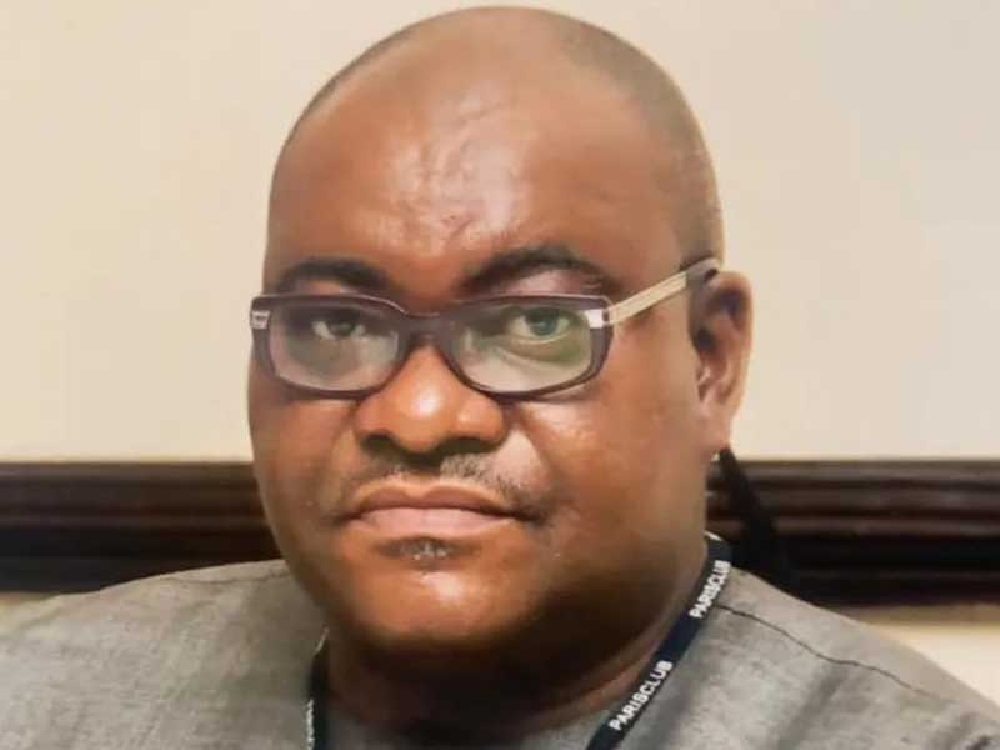
BY BOLAJI AFOLABI
Oftentimes, it’s always challenging to organize commemorative parties for those who have distinctions in this pastime. Dr. Tunde Olusunle, Adjunct Professor of Creative Writing at the University of Abuja; recently re-named Yakubu Gowon University is one of the few masters in the game. Over the last two decades of close relationship with him, he has played massive roles in organizing parties for people. Call him a highly-rated events planner, you may not be wrong. He is not the usual, typical party planner around who has taken up the vocation as business. Olusunle does this for people dear to him; friends, bosses, colleagues, associations, communities, and more pro bono. At any of these occasions, he throws everything towards making the event successful. He invests his time, intellect, organisational savvy, and personal resources; months, weeks, and days to make the event grandiose. Some of his close friends eulogized his dexterity, expertise, and capacities in single-handedly coordinating parties, events, and other celebrations.
The writer, cognisant that Olusunle will mark his birthday in the month of March, was somewhat worried. Why? This year’s birthday was different, as the multi-tasking professional will climb “six stairs” and join the unique club of 60. So, who will coordinate a befitting birthday shindig for the “master organizer?” Can such match the quality of similar others that Babaeto; one of his titles, and moniker loosely translated as “Chief Organizer” has arranged for people? How can the standard set by him be met, if not surpassed? Still pondering, a thought came to mind. Given the national economic crisis that has led to accentuating poverty, staggering hyperinflation, disabling unemployment, corrosive hunger, and more, Olusunle; who is ever conscious of situations around him, may spring surprises. He may opt for simpler and modest celebrations.
About two weeks to d-day, an e-invite forwarded to the writer confirmed one’s thought. The card was beautiful in colours; aesthetic in design; and unique in words. Having close similarities with Babaeto’s imprimatur, it read, “please join us for drinks, bites, and laughter as we commemorate the Diamond Birthday of our father, husband, brother, and good friend; Tunde Olusunle ……” Further checks confirmed that the event was packaged by Dr. Funmi Olusunle, with Aramide, Yomi, and Tobi; wife and children of Babaeto was to be a modest gathering of people. On this, the “plotters” scored a bull’s eye. Surely, Olusunle will be excited that his ever-loving, dependable, and reliable better-half of over three decades, and scions are gradually “edging him out” in the plotting, planning, and execution of numerous surprise parties for people.
The weather on Sunday, March 30 was clement and friendly, away from the scorching sun of the previous day. This was the first surprise while heading to the event. Driving through the Gaduwa-Lokongoma axis of the capital city, the writer had another round of pleasant surprises. Making a detour, vehicular movements to the Estate gate; which was over 400 meters away, gave an idea of what to expect. After “snaking and snailing” through the entrance, which was about 100 meters to the residence, it became clear, and evident that this may not be a small event, as originally planned. The writer, struggling for a comfortable parking space, recalled what Pastor Tumo Ojelabi; a retired Director, Federal Ministry of Information earlier said, “Oga is a friend to all. It is almost impossible to have a small party to mark his 60th birthday. Many people will attend the event, either invited or not.”
Scheduled to officially commence by 5 pm, the programme was up and running an hour before. Given the elaborate preparations for any eventualities, the early arrivers were treated to a collage of bites, drinks, and soul-lifting songs. In between, there were memorable photo sessions on the lush green carpet emblazoned with Olusunle’s very visible portrait properly affixed. As the day progressed, more people made their ways to the beautifully decorated outer foyer of the celebrant’s residence. Hearty exchange of pleasantries, excited high-fives, warm embraces, friendly hugs, and more swept the entire atmosphere. The lively gathering was an admixture of grandparents, fathers, and mothers. Not forgetting the youths, and children. Typical of Olusunle’s enviable virtues of accessibility, humility, humanity, and inclusivity, guests and attendees cuts across different strata of the society.
With Yomi standing-in for the day’s master of ceremonies, (MC), the programme commenced a few minutes past five in the evening. Pastor Omotoba of the Redeemed Christian Church of God, (RCCG) offered the opening prayers, which was brief and impactful. Yomi, as the fill-in compere did a good job, as she was able to galvanize the audience with few jokes, gesticulations, and puzzles. Perhaps sensing the bulk of the happy guests were in their 40s to 60s, she requested for the rendition of early-school rhymes in the 1970s to late 1980s. Masterstroke! Led by a few ladies, the entire place came alive as it brought back nostalgic memories. Thereafter, the MC took over. Aramide delivered a “love letter” that was full of emotions, inspiration, and gratitude. Tobi, the “baby” of the house, who is a strong supporter of English Premier League’s Manchester United was working behind the scenes to ensure the overall success of the birthday bash.
Virtually all those called to describe Olusunle in one word, used the opportunity to heap praises, prayers, and commendations on him. Dr. Tivlumun Nyitse, Associate Professor of Mass Communications at Bingham University, Abuja, confirmed that, “we have been friends for over 40 years. Over the years and decades, the relationship has grown from family to brothers. As I wish him a happy diamond birthday, I advise him to slow down.” Dr. Femi Ajisafe, an agriculture entrepreneur affirmed that, “we both joined, and started work as secondary school teachers somewhere way-off modernity in a rustic, and sleepy community in Kogi state over three decades ago. Happily, we have been together; and our respective families ever since.”
Saluting Olusunle’s resilience, Dr. John Olarewaju, former Director-General, Michael Imodu Institute of Labour and Development Studies, (MIILDS) revealed, “he is ever dogged, determined, and sacrificial. So committed and consistent with writing that he can do it anywhere.” For Dr. Clem Baiye, former Managing Director, Daily Times PLC, “Olusunle is a go-getter.” An obviously joyous and excited Madam Elizabeth Olusunle, Mother of the celebrant expressed appreciation to family members and friends, particularly Dr. Funmi Olusunle for her steadfast love, and consistent understanding of everyone. Mama, also prayed for her dear son. The session ended with an inspiring Yoruba rendition by Anuoluwapo Favour Fabiyi; a hugely gifted and brilliant teenager.
As the evening progressed, it was clear that the planned simple hoedown turned to a classy, high-energy reception laced with flair and flash. Evidently wrapped in panache, pomp, and pageantry. From meals to drinks, jokes, and more, the get-together had trappings of charm, elegance, and sophistication. The dazzles and allure literally arrested everyone all through. It was exciting, entertaining, and memorable. Filled with thrills, frills, grills, and much more. The night was filled with revealing stories and engaging reminiscences that will be inspiring takeaways for many people. The excellent dishing and mixing of “old school” songs got many; including the writer either humming the lyrics, shaking heads, moving bodies or hitting the dance floor.
Indeed, the quality and quantity of guests who came to honour Olusunle; at short notice was a worthy testament of the recognition and acceptability of the celebrant as a “peoples man.” The roll call of personalities was large. Chief Onyema Ugochukwu, pioneer Chairman, Niger Delta Development Commission, (NDDC), and his lovely wife, Dr. Joyce Ugochukwu; AIG Tony Olofu, (Rtd), and wife, DIG Rhoda Olofu; Hon. Leke Abejide, Member representing Yagba Federal Constituency, and his wife were there. Dr. Boboye Oyeyemi, former Corps Marshall, Federal Roads Safety Corps, (FRSC); Pastor Tunde Ipinmisho, former General Manager, Public Affairs, Federal Housing Authority, (FHA); Prof. Sunnie Ododo, former Chief Executive Officer, National Theatre. Dr. Emmanuel Ikpeme, Deputy Secretary-General, Nigerian Football Federation, (NFF); Chief Femi Melefa, consultant and entrepreneur; Pastor Yomi Babaniyi, and wife, and many others graced the occasion. Not forgetting Hon. TeeJay Yusuf, and Deputy Corps Marshall Clement Oladele, who were out of the country and Abuja respectively, but extended their congratulatory messages to Olusunle.
As the elegant soiree spread late night guests had more to savour. Properly garnished, sumptuous delicacies, refrigerated drinks, and eye-popping small chops flowed endlessly. Undoubtedly, the knees-up; according to the British were exhilarating and enthralling. For many, the event, turned out to be a worthy, timely rendezvous of sorts. There was a reunion of old friends; re-kindling of friendships; and building of new networks. Many agreed that it will be an unforgettable experience.
* BOLAJI AFOLABI, a Development Communications specialist was with the Office of Public Affairs, The Presidency, Abuja.
Opinion
CELEBRATING A PRODIGIOUS WORDSMITH: TUNDE OLUSUNLE @ SIXTY
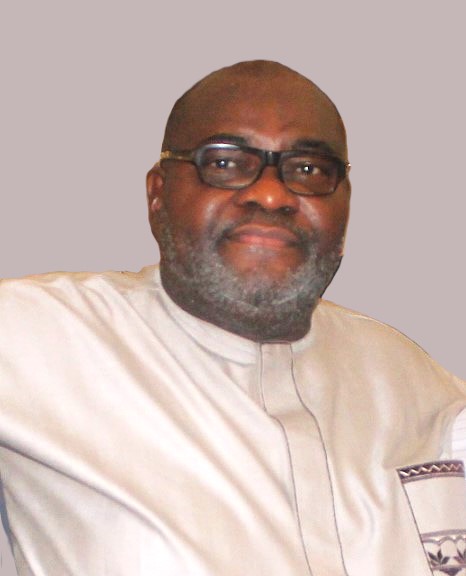
BY BOLAJI AFOLABI
Poring over countless title-ideas for this article, the above emerged from the blues. Further checks about the subject confirmed the title as fit and proper. Describing Tunde Olusunle as a “prodigious wordsmith” is no exaggeration. In every of his work, he comes across as one who has vocabulary virtuosity, and endowed with narrative mastery. He displays unimaginable linguistic dexterity which is intertwined with rhetorical flair, and imbued with creative vision. He carves the right words, and descriptive styles to paint beautiful scenery of complex and cumbersome situations. He crafts, engages, and suspends readers till the last words are happily soaked in. So, the title is both deliberate and intentional.
Dr. Tunde Olusunle, an Adjunct Professor of Creative Writing at the University of Abuja; which was recently re-named Yakubu Gowon University, is a man of many parts. He is a celebrated journalist; author; poet; communicator; and public speaker. Thus, he fits into all the fields where intellect, elucidation, and erudition coalesce. As a Columnist and Editor, he rose to the top of Journalism. In Literature, aside from having degrees, he has many published (and yet to be published) poems. He has written, co-written, edited, and co-edited over a dozen books; earning the Fellowship of the Association of Nigerian Authors, (FANA). In the last few years in academia, he is making exceptional accomplishments as a scholar, teacher, and researcher nurturing and mentoring a new generation of creative writers.
Sometime in the ’90s; during the Late General Sani Abacha regime, the writer went to the Saka Tinubu, Victoria Island, Lagos office of an elder brother; Ade-Ralph Olamife. After late lunch at the classy canteen within the precincts of the Nigeria Telecommunications Limited, (NITEL) offices, the host extended an invitation. He said, “I want you to join me later today to meet a friend coming from Ikeja.” About 7 pm, we (Olamife, two other friends, and the writer) drove into Bishop Oluwole Street in Victoria Island, Lagos. The building was the Kogi state Liaison Office at that time. Surprisingly, the august friend, who came with another person was already seated. After the exchange of pleasantries, the subject of this article was introduced by Olamife. Olusunle, who came with Alhaji Hakeem Bello; later Media Adviser to Babatunde Raji Fashola, (SAN), interacted freely with everyone. During the over two hours sit-out, Olusunle came across as a witty, lively, intelligent, and brilliant personality.
After this first meeting, the writer; through Olamife had subsequent interactions with Olusunle in Ikeja, Maryland, Ikoyi, and Victoria Island areas of Lagos. On every occasion, he exudes confidence and accessibility just as his humble and humane attributes come alive. After over a year of gap, largely due to the analogue communication state, and his relocation out of Lagos, Olamife broke the cheering news of Olusunle’s appointment as the Chief Press Secretary to the Kogi state Military Administrator; Col. Paul Omeruo. A few months later, the writer accompanied (as usual) Olamife; to visit Omeruo in Lokoja. By the way, both Olusunle and Olamife are mutual friends to the Administrator, fondly referred to as PUNO; initials of his names. During the two-week visit, Olusunle was the perfect host; he made every evening eventful and memorable. From discussions, many civil servants spoke glowingly about him. In and around the Lugard House; Administrator’s residence and office, as well as Ministries, Departments, and Agencies, (MDAs), his interpersonal relationships were eulogized. Succinctly, he could be described as a people’s man.
With the birth of democracy in May 1999, and the inauguration of Chief Olusegun Obasanjo as the President and Commander in Chief of Nigeria, the writer partially relocated to Abuja, hoping to explore opportunities in the new government. Watching the Nigerian Television Authority’s flagship news, the advert inviting people to the official launch of the new administration’s “Campaign for National Rebirth” sounded interesting. The writer made his way to the purposely-built Eagle Square venue of the event. As the programme progressed, the presence and importance of Olusunle was very evident. Events over, the writer swiftly moved from the stands down the platform to offer salutations to him. Pushed, shoved aside by over-zealous security operatives, it was a herculean task. At the point of giving up, an incident happened which diverted the attention of almost everyone. Leveraging on this, the writer made his way to the dais. Standing before Olusunle, he called the writer’s name, hugged, and exchanged pleasantries. Quickly, he said, “I’ll be out of Abuja for one week, meet me at Sheraton Hotels next week please.”
The writer’s visit to Sheraton Hotels marked the beginning of a relationship that has grown in leaps and bounds. Either at the Hotel’s Papillon Restaurant or the Poolside Bar, and Nicon Noga (now Transcorp) Hilton Hotel, the compassionate, empathetic, and accommodating attributes of Olusunle always come to the fore. They were unmistakable and unequivocal. During one of the numerous visits, he requested for the writer’s curriculum vitae; without saying what he wanted to do with it? It was discovered, early that he loves working behind the scenes. Beneficiaries of his advocacy, and benevolence only get to know when “food don done for eating.” One recalls on a visit to his 7th floor, Sheraton Hotels “temporary official residence” he beckoned on the writer to accompany him to somewhere. In a few minutes, we were in one of the suites at the Hilton Hotel, only to see Chief Onyema Ugochukwu, emeritus journalist, and public administrator walked in. With shock, suspense, and excitement written on one’s face, Olusunle introduced the writer saying, “Oga, this is one of our younger but silent supporters.”
A few months later, the import of that visit came to light. Through the persistent advocacy, and resilient prodding of Ugochukwu and Olusunle, President Obasanjo gave approval for major recruitments to strengthen the rebirth campaign, and public affairs management of the new government. So, the writer and other people benefitted from a forward-thinking proposal that was primarily targeted at media professionals who were part of the Obasanjo presidential campaign organization. Pastor Tumo Ojelabi, a retired Federal Director who was one of the beneficiaries declared that, “Oga, is a fastidious personality, a determined helper who can be positively stubborn, and dogged when pursuing a course that he has strong conviction about.” Continuing, Ojelabi, who was the official Photographer to Obasanjo during the presidential campaign said, “but for his resilience, courage, and never-quiver spirit; and Oga Ugochukwu, many of us who toiled during the campaigns would have been left dry.” For Mr. Taiwo Akinyemi, who was Obasanjo’s campaign Official Videographer, “Olusunle is a fighter; a dynamic fighter for other people. When he realized that politicians who did not contribute much to Baba’s electoral success were getting their loyalists into the new government, he fought relentlessly for us all. God used him to get me employed in the federal civil service, I remain eternally grateful.”
Olusunle is a pan-Nigerian, totally detribalized, and not given to ethnicity, religious segregation and similar stereotype. Described by close friends as diligent, dedicated, and devoted to friendship, Olusunle remains a restless and tireless quester for knowledge and new challenges. Given his multi-dimensional, and multi-tasking skills and proficiencies, he can excel in whatever profession, assignment, and position. Energized by his voracious search for new ideas, he is almost, always thinking out of the box. Very ingenious, creative, and imaginative, one recalls few initiatives that came from his fertile mind during the Obasanjo presidency. Persistent encouraging words about Nigeria’s sports which led to the inclusion of the “sports brief” to his schedules. Advocacy for the hosting of the Commonwealth Heads of Government Meeting, (CHOGM) at any of the nation’s resorts; which informed him leading a team of journalists, tourism experts, and bureaucrats to the Yankari Games Reserves in Bauchi. What about the National Media Tour, though initiated by him but hijacked by a few top government officials who at the end muddled the entire programme?
Corroborating, Mr. Vincent Oyefeso, a retired Federal Director, and another beneficiary of the Obasanjo appointments approval, said, “he is an illustrious Nigerian and a patriot per excellence, who bestrides many walks of life as an intellectual collossus, a humanist of no mean hue, and an advocate of the finest social ethos. At the realms of public communications, the academia, and public service, he exudes the best practices worthy of emulation by right-thinking compatriots.” For Mr. Ukadike Uwabor, a media communications consultant, “since I’ve known him, he has remained consistent with the core values of excellence, versatility, and intellect. He relates perfectly with different people no matter the age, religion, tribe, or social status. Little wonder his friends cut across different strata of the society. That the people of Umukabia autonomous community in Abia state conferred on him a chieftaincy title; which is outside his geographical, ethnic, and linguistic zone speaks volumes about his personality.” Olusunle by the way, has few other titles bestowed on him in different parts of the country.
Agreed, no human being is perfect but the writer has personal experiences about Olusunle that remains nostalgic. Indeed, the over two decades relationships have grown from one stage to the other. From boss to teacher, mentor, and motivator. He has played (and continues to play) different roles in one’s professional development, and career progression. Perhaps, he may not realize this; while working with him, Olusunle doesn’t attend meetings alone. The writer, Late Alhaji Wasiu Anjous, and (on few occasions) Akinyemi accompanied him to any meeting, particularly with MDAs. Another striking feature was that he introduced you as a “colleague.” With that, one’s stock, respect, and recognition increases. One of the fall-out of such remarkable style happened at the 2004 Olympics Games in Greece, when Late Mr. Solomon Matankari, Nigeria’s Chef de Mission, and Sports Ministry’s Permanent Secretary insisted on the participation of Anjous and the writer in high-level meetings.
Not persuaded by the hierarchical structure of the civil service, Olusunle places premium on availability, delivery, and consistency. Just a few months after being deployed to his office, the writer had a baptism of fire. Barely 48 hours after one of the regular presidential chats, Olusunle passed the recorded tape, and declared, “do transcribe and deliver in three days.” Sensing shock, and surprise, he encouraged, “you can do it, go at your pace.” On another occasion, a few days after commending the writer on a piece, “From Saw Dust To The Skies,” he said, “write a speech for Dr. Mrs. Kema Chikwe, the Aviation Minister, for a programme this Saturday to be held in Garki, Abuja.” Though tough but exciting, it marked my entry into the exclusive class of speech writers; till this moment. Sometime in 2023; after long hiatus from opinion writing, due to a new assignment at the National Assembly, the writer did a piece. Impressed, Olusunle called immediately, “BJ, I’ve just read your brilliant article. I encourage you to make this more regular, please. I’m available to offer any support where and when necessary.” Truly, he has kept faith to his promise in the over thirty articles written between December 2023 and now.
This is the man we are celebrating today, and always. Olusunle is an extremely organized personality, whose writings and interventions are laced with irrefutable data, educative instances, and inspiring suggestions. When occasions demands, you can’t help but applaud his depth of knowledge, information reservoir, deep vistas, and un-ending capacity. Oyefeso prays that, “the Lord grants him peace as he steps into the sixth floor. The Father of Lights will continually uphold and uplift him from Glory to Glory in Jesus Name.” Mr. Jacob Zwings, aide to Director-General, National Orientation Agency added that, “Oga Tunde, in his own way has impacted positively on the lives of people. On the occasion of his Diamond jubilee, I pray that God will perfect everything that concerns him and his family.” Akinyemi declared that, “just as he has been a blessing to other people’s children, God will bless him, his wife, and children.” Uwabor believes that, “Enyi Oha has become a reference point to many people. The good Lord will grant him more years in good health as he age gracefully with abundance of all-round blessings.” Ojelabi affirmed that, “Olusunle is who he is today; an accomplished man who stands tall among his peers because of his commitment towards extending helping hands to those who needs it.”
* BOLAJI AFOLABI, a Development Communications specialist was with the Office of Public Affairs, The Presidency, Abuja.
Opinion
PROFESSOR HUMPHREY NWOSU: THE UNSUNG HERO OF TRUE NIGERIAN DEMOCRACY
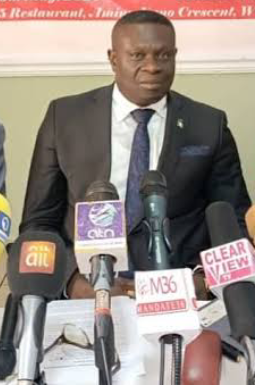
Written by Dr. Nwambu Gabriel,Director General, Centre for Credible Leadership and Citizens Awareness
Introduction
The journey to democratic governance in Nigeria has been fraught with challenges, conflicts, and untold sacrifices. Among the gallant figures who stood resilient in the face of adversity was Professor Humphrey Nwosu. As we mourn the loss of a remarkable leader and an indomitable champion of democracy, we reflect on his contributions and unwavering commitment to the electoral process, which laid a foundational path for Nigeria’s democratic practice.
A Visionary Electoral Leader
Professor Nwosu’s tenure as Chairman of Nigeria’s National Electoral Commission (NEC) from 1989 to 1993 marked a pivotal era in the nation’s electoral history. Unlike many of his contemporaries, Nwosu approached his responsibilities with an unwavering resolve to uphold the sanctity of the electoral process. He successfully organized several elections, including Local Government Chairmanship, Governorship, and State and National Assembly elections, which were lauded for their transparency and fairness. His most significant achievement came with the conduct of the June 12, 1993, presidential elections, widely regarded as one of the freest and fairest elections in Nigeria’s history.
Courageous Stand Against Adversity
In an environment characterized by military interference and political manipulation, Nwosu exemplified courage. He boldly overturned a court order issued on June 10, 1993, that sought to halt the presidential elections. Despite facing intense pressure from the military establishment led by Ibrahim Babangida (IBB), he remained resolute, emphasizing his commitment to ensuring that the elections were conducted as planned. His insistence on completing his mandate, even when his commission was dissolved midway through the electoral process, is a testament to his integrity and dedication.
His unyielding stance culminated in the announcement of results from 29 out of 30 states in the June 12 elections. Although General Ibrahim Babangida annulled the elections before Nwosu could declare the final results, his steadfastness demonstrated his belief in the democratic process and the necessity of honoring the voice of the Nigerian electorate.
Championing Democracy Through Documentation
Professor Nwosu did not allow the annulment of the June 12 elections to silence his voice. In his book, *Laying the Foundation of Nigeria’s Democracy: My Account of June 12, 1993 Presidential Election and Its Annulment*, he chronicled the events leading to the election and its aftermath. By publishing the results of the June 12 elections, he presented irrefutable evidence of MKO Abiola’s victory, reinforcing the notion that the people’s will should prevail over political machinations. This documentation serves as a historical account of a significant moment in Nigeria’s struggle for democracy and a rallying cry for future generations.
Legacy of Integrity
As we reflect on Professor Nwosu’s life and contributions, it is essential to recognize his legacy of integrity, bravery, and unwavering commitment to democratic principles. He stood as a beacon of hope during a tumultuous period in Nigerian history, proving that one individual’s resolute stand could indeed lead to monumental change. His story serves as an inspiration to current and future leaders to prioritize the will of the people over personal or political gain.
Conclusion
The passing of Professor Humphrey Nwosu is not just a loss to his family and friends but to a nation that desperately needs champions of democracy. His actions during the critical moments of June 12, 1993, solidified his place in history as a true man of democracy. As we commemorate his life, we are reminded that democracy thrives through the courage and integrity of individuals like Professor Nwosu—those who are willing to stand firm against oppression and ensure that the voice of the people is heard.
May his soul rest in peace, and may his legacy continue to inspire generations to uphold the values of democracy, transparency, and justice in Nigeria.
-
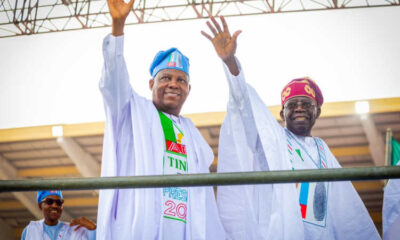
 Politics7 hours ago
Politics7 hours agoTinubu Gives Fani Kayode, Others New Appointments (See Full List)
-

 News7 hours ago
News7 hours agoDANGER! Ex-Soldier Abubakar Affan Vows to Kill VeryDarkMan ‘Like Deborah Samuel’
-
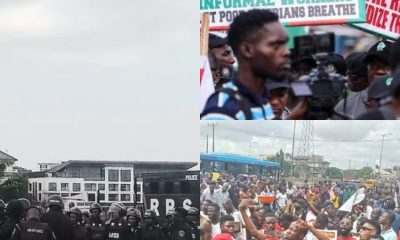
 News23 hours ago
News23 hours agoSecurity Alert: Police alert officers ahead of nationwide protest over living costs, free speech
-

 News11 hours ago
News11 hours agoWhy NYSC maybe extended by FG- Minister
-

 News21 hours ago
News21 hours agoVOA Halts Operations In Nigeria, Others Over President Trump
-

 News10 hours ago
News10 hours agoIbas moves to rehabilitate damaged Rivers LG secretariats
-
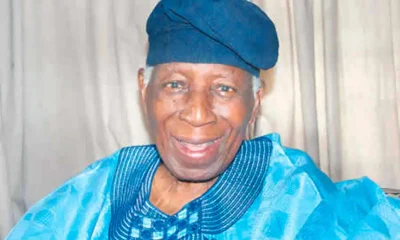
 News8 hours ago
News8 hours agoJust in: Ex-Oyo governor, Olunloyo is dead
-

 Economy11 hours ago
Economy11 hours agoCBN allocates $197.71m into FX market to support naira






